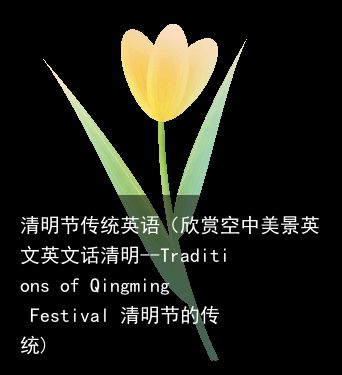清明节传统英语(欣赏空中美景英文英文话清明--Traditions of Qingming Festival 清明节的传统)

英文话清明--Traditions of Qingming Festival 清明节的传统



Hello everyone, Welcome to WendyEnglishTimes, 欢迎来到Wendy的英语时光,英文话清明,今天我们来聊聊清明节的传统Traditions of Qingming Festival。
清明节

Qingming Festival (also known as Tomb-sweeping Day), which falls on either April 4th or 5th of the gregorian calendar, is one of the Chinese Twenty-four Solar Terms. From that date temperatures begin to rise and rainfall increases, indicating that it is the crucial time for plowing and sowing in the spring. The festival therefore has a close relationship with agriculture. However, it is not only a seasonal symbol; it is also a day of paying respect to the dead, a spring outing, and other activities.
清明节是中国二十四节气之一,每年的公历4月4日或5日为清明节。从这一天开始,气温开始上升,降雨量增加,这表明这是春季耕地和播种的关键时间。因此,这个节日与农业有着密切的关系。然而,它不仅是一个季节的象征;这一天人们还会祭拜逝者,去春游以及进行其他活动。

The Origin of Qingming Festival
清明节的起源
It is said that the Qingming Festival was originally held to commemorate a loyal man named Jie Zitui. Jie cut a piece of meat from his own leg in order to save his hungry lord who was forced to go into exile when the crown was in jeopardy. The lord came back to his position nineteen years later, and forgot Jie Zitui but later felt ashamed and decided to reward him. However, Jie had blocked himself up in a mountain with his mother. In order to find Jie, the lord ordered that the mountain should be set on fire. Later Jie was found dead with his mother. In order to commemorate Jie, the lord ordered that the day Jie died was Hanshi (Cold Food) Festival - the day that only cold food could be eaten.
据说,清明节最初是为了纪念一个名叫介子推的忠臣。介子推的君主晋文公被迫流亡时,王位处于危险之中,介子推从自己的腿上切下一块肉,以拯救他饥饿的君主。十九年后,晋公回到了他的位置上,却忘记了介子推,后来他感到羞愧,决定奖赏重用他。然而,介之推和他的母亲隐居在了一座山上。为了找到介之推,晋公下令放火烧山。后来人们发现介之推和他的母亲一起被烧死了。为了纪念介之推,晋文公下令介之推去世之日为寒食节,这天只能吃冷食。
The second year, when the lord went to the mountain to sacrifice to Jie, he found willows revived, so he gave instructions that the day after Hanshi Festival was to be Qingming Festival. Later, the two festivals were combined as one.
第二年,晋文公上山祭拜介子推时,发现柳树又活了,便下令把寒食节的第二天定为清明。后来,两个节日合二为一。
Traditional Customs
传统风俗

Qingming Festival is a time of many different activities, among which the main ones are tomb sweeping, taking a spring outing, and flying kites. Some other lost customs like wearing willow branches on the head and riding on swings have added infinite joy in past days. It is a combination of sadness and happiness.
清明节有许多不同的活动,其中最主要的是扫墓、踏青和放风筝。其他一些久远的习俗,如头上戴柳枝和荡秋千,给过去的日子增添了无限的欢乐。这是悲伤和快乐的结合。

Tomb Sweeping
扫墓

Tomb sweeping is regarded as the most important custom in the Qingming Festival from which the name of Tomb-sweeping day is got. Cleaning the tomb and paying respect to the dead person with offerings are the two important parts of remembering the past relatives. Weeds around the tomb are cleared away and fresh soil is added to show care of the dead. The dead persons favourite food and wine are taken to sacrifice to them, along with paper resembling money. This is all burned in the hope that the deceased are not lacking food and money.
扫墓被认为是清明节中最重要的习俗,清明节的名字也由此而来。扫墓和祭品是追忆故人的两个重要部分。墓碑周围的杂草被清除,并添加新鲜的土壤,以表示对死者的关心。逝者最喜欢的食物和酒,连同纸钱一起被拿来作为祭品。这些东西都被烧掉,旨在希望死者不缺食物和金钱。
Today, with cremation taking over from burying, the custom has been extremely simplified in cities. Only flowers are presented to the dead relatives and revolutionary martyrs. No matter how respect is shown, good prayers for the deceased are expressed.今天,随着火葬取代土葬,城市里的习俗已经大大简化了。只有鲜花献给死去的亲人和革命烈士。无论哪种形式表达敬意,都是对逝者的祈祷。
Spring Outing
春游

Not only is it a day for commemorating the dead, is it also a time for people to enjoy themselves. During March, everything in nature takes on a new look, as trees turn green, flowers blossom, and the sun shines brightly. It is a fine time to go out and to appreciate the beautiful scenes of nature. This custom can be traced back to the Tang Dynasty (618 - 907) and followed by each dynasty later till today. So visitors can be seen everywhere during the month of the festival. Spring outings not only add joy to life but also promote a healthy body and mind.
它不仅是一个纪念死者的日子,也是一个人们享受快乐的时光。在三月,自然界的一切都呈现出新的面貌,树木变绿,鲜花盛开,阳光灿烂。这是一个外出欣赏大自然美景的好时节。这一习俗可以追溯到唐代(618 - 907),并一直延续至今。所以在节日期间到处都能看到游客。春游不仅给生活增添了乐趣,还能促进身心健康。
Flying Kites
放风筝

Flying kites is an activity favored by many people during the Qingming Festival. Kites are not only flown during the day time but also in the evening. Little lanterns are tied to the kite or to the string that holds the kite. And when the kite is flying in the sky, the lanterns look like twinkling stars that add unique scenery to the sky during the night. What makes flying kites during this day special is that people cut the string while the kite is in the sky to let it fly free. It is said this brings good luck and that diseases can be eliminated by doing this.
放风筝是清明节期间许多人喜爱的活动。风筝不仅在白天放,晚上也放。小灯笼被绑在风筝上或绑在风筝的线上。当风筝在天空中飞翔时,灯笼看起来像闪烁的星星,为夜晚的天空增添了独特的风景。在这一天放风筝的特别之处在于,人们会在风筝在空中的时候剪断风筝线,让它自由飞翔。据说这样做能带来好运,还能消除疾病。

All in all, the Qingming Festival is an occasion of unique characteristics, integrating sorrowful tears to the dead with the continuous laughter from the spring outing.
总而言之,清明节是一个独特的节日,既有对逝者留下的悲伤的眼泪,也有春游带来的持续的欢笑声。
好,以上就是本期的全部内容了,希望本期内容能够对你有所帮助。Thank you very much for your listening and Ill see you next time. Bye!
 WendyEnglishTimes有声英文公众号从生活中学习英文
WendyEnglishTimes有声英文公众号从生活中学习英文

